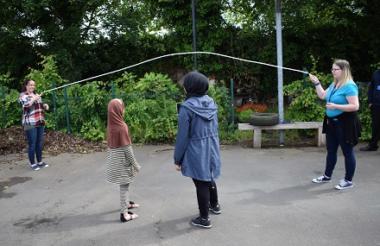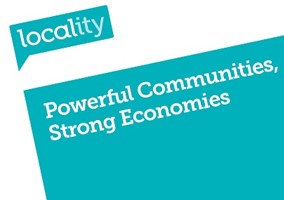Over the years more and more of our public services have ended up in large outsourcing contracts, provided by multi-national companies. We have seen services scaled up and standardised. While this may have provided some short term budgetary relief for councils, it is not helping long-term, harder-to-solve problems. Rising demand and the increasingly complex nature of need have been placing services such as social care under strain and facing crisis.
Despite the rhetoric regarding market-driven innovation, it is hard to see this in over-stretched public services delivered by a private profit mind-set where people are the passive recipients of services rather than equal partners in delivery. I often use the analogy of a sausage machine, where people are seen as inputs and outputs which meet targets related to financial incentives rather than complex, able and unique individuals.
Mega contracts have crowded out community-based organisations, small charities and local businesses. This is frustrating to say the least, when you consider they are best placed to offer a huge range of services from tackling homelessness; employment support; children’s services to adult social care where trusting relationships, a person-first approach and innovation are required.
The collapse of Carillion has further shown that a new approach is desperately needed and it has changed the debate around risk. Having one big contract with one big provider is certainly not a risk free approach; quite the opposite in fact.
Keep It Local
In the face of these trends it is really exciting that Keep It Local is gathering pace to show a kinder, better and more sustainable way of delivering our public services. It is led by Locality, the national membership network for community organisations which are embedded in neighbourhoods up and down the country.
Keep it Local starts with this approach; building relationships between local authorities and local organisations that recognises and builds on community assets, capabilities and experience.
At Halifax Opportunities Trust we have been working collaboratively with Calderdale Council who have taken a community based approach for several years.
Our communities have benefitted from a range of initiatives developed by the council alongside local community organisations. These include asset transfers, ongoing grants programmes (and other resource sharing), use of social value in procurement and community anchor and asset transfer policies.
This means that public services and vital publicly owned buildings from swimming pools to libraries are provided and run by local organisations rather than sold off to the highest bid from a remote provider, disinterested and un-invested in the local place. These buildings, contracts and grants are being used to create community hubs, which provide space for integrated and compassionate enterprise, recreation and learning.
Thoughtful commissioning, such as Staying Well, the local social prescribing scheme in Calderdale which is delivered via community organisations and a willingness to try innovative practice (such as alliance contracting, where the commissioner is part of a shared ‘risk and reward’ contract) have also been introduced.
Smaller contracts
The way that councils are funded is also changing, meaning they are much more reliant on the success of the local economy. This means there is growing interest in using procurement to invest in the local economy which enables profit to be ploughed back into the community.
For example, Halifax Opportunities Trust created “The Outback” community garden and kitchen on disused land using our surpluses. It is a fabulous facility based in the centre of very concentrated housing and business, providing green space, organic fruit and vegetables and a communal kitchen for local people to cook, eat and meet.
Five years ago Halifax Opportunities Trust successfully bid for a contract to run half of the children’s centres and children’s centre nurseries across Calderdale. Our colleagues at North Halifax Partnership (another local community organisation) won the contract to deliver the other half.
We were able to do this as the council created smaller contracts and placed emphasis in the procurement on social value and innovation.
My experience working with Calderdale Council has shown that there are all sorts of positive ways in which local authorities can build strong relationships with the sector – from respecting and listening to lobbying and campaigning groups, to the provision of small grants and involving us in planning and development decisions.
Occasionally, as with any relationship that has lasted for 20 years there are wobbles and disagreements but because there are some fundamental values that we both share we can sit down, be honest about what has happened and find a way to resolve them.
Improving local commissioning
Along with councils, commissioners and communities, Locality has designed six Keep It Local principles to aid the continuation of high level support across councils:
- Think about the whole system and not individual service silos
- Coordinate services at the neighbourhood level
- Increase local spend to invest in the local economy
- Focus on early intervention now to save costs tomorrow
- Commit to your community and proactively support local organisations
- Commission services simply and collaboratively so they are local by default
Given my experiences working with Calderdale, I wanted to provide some thoughts for ways that community organisations can shift their council’s practice towards a Keep It Local approach.
Firstly, be absolutely clear about your organisation’s purpose and the values that underpin its approach. Understand the social value that you provide and ensure you can clearly articulate this.
Secondly, link your influencing to a local challenge that your council is facing and show how you are tackling this issue and adding social and local value. Think too about how you could do more with the right resources.
Thirdly, be self-reflective. The conversations about Keep it Local involve give and take so consider how you need to change behaviour and approach, as well as expecting the local authority to change theirs.
Fourthly, partnership between voluntary and community organisations is incredibly powerful and brings together place-based knowledge and an understanding of specific people and themes. Always think about how to come together with others to create the strongest and most nuanced community response. Ask yourself about community capacity in your area. Can you collaborate with other voluntary and community organisations to make your case to local decision-makers? Is your local infrastructure organisation already making a similar case? How can you support them? Do they have evidence about the local voluntary sector that you can use?
Fifth - be pragmatic and identify who you need to engage with. High-level decision makers – in political and operational positions – are crucial but they’re not the only ones. Backbench councillors, including those responsible for scrutinising cabinet decisions, are also important as champions and representatives of the local place, as are staff with delegated responsibility for specific areas of delivery. There are a number of procurement and commissioning staff you may wish to engage, as well as legal and finance teams.
In summary, Halifax Opportunities Trust has, in the main, a mature and collaborative relationship with Calderdale council. We are trusted to get on and deliver excellent services with and for local people, and in turn we trust the council to be a supportive partner. When community organisations and local authorities get the relationship right, the results for all are positive, beneficial and in everyone’s best interests.
|
Related articles












